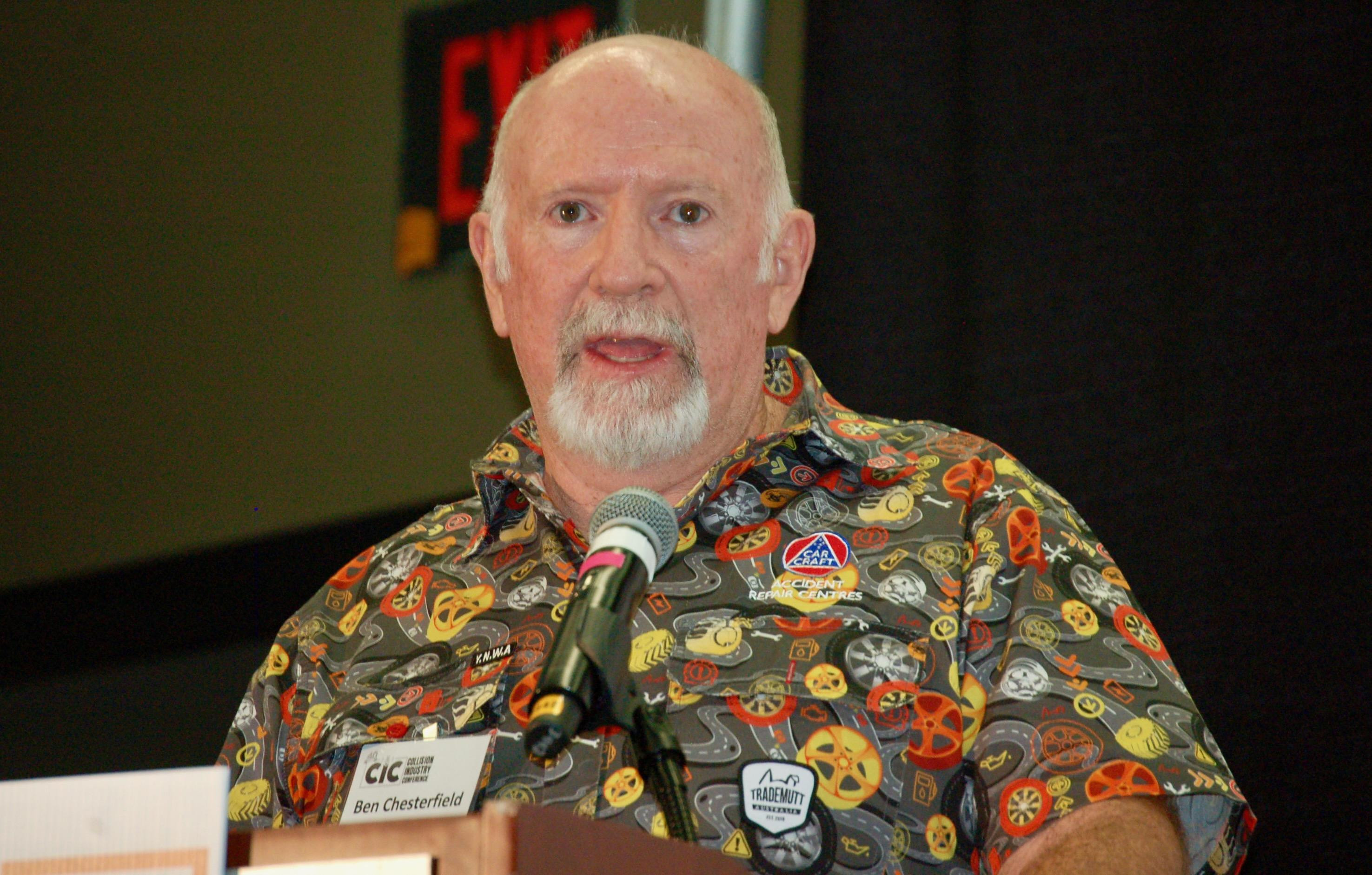In an effort to get more of the industry open to talking about mental health concerns, several speakers at recent industry meetings did just that.
Ben Chesterfield of Car Craft Accident Repair Centers, which operates 150 shops in Australia, said he learned most corporate mental health programs are little more than a toll-free number to speak to someone who can in turn connect the caller with a counselor. He felt there should be something more.
 Ben Chesterfield.
Ben Chesterfield.
“Whether it’s personal or professional, you’ve got employees who are probably going through something at the moment and don’t know how to talk to anybody about it,” Chesterfield said at the most recent Collision Industry Conference (CIC).
He and an Australian trade association are now working together with a company called Trademutt that “works on making an impact in the mental health space among the blue collar workforce of Australia and abroad.” Together, they created and are selling automotive-themed shirts to raise awareness of — and funds for — a no-cost counseling service for anyone who needs it.
“We needed a tagline on the back of the shirt, so I came up with, ‘Don’t shut the bonnet on it,’” Chesterfield said, a reference to the Australian term for “hood.” “The message we are trying to get out is don’t shut the bonnet on mental health. Don’t shut the bonnet on whatever’s going on in your life.”
He said shops and others in the industry are purchasing the shirts to wear on “funky Fridays.” A QR code under the pocket flap is the link to the counseling service.
“We all know there’s a problem with staffing in our industry,” Chesterfield said. “Parents that want their kids to get into an industry where they know they're being looked after. So this is not just about the people who might be dealing with everyday issues. It’s also about the people we’re trying to attract to our trade.”
Collision Repairer Starts Nonprofit
A few hours after Chesterfield’s presentation at CIC, Andy Tylka, a board member of the Society of Collision Repair Specialists (SCRS), said he appreciated the mental health topic being raised at CIC.
“I personally have always struggled with mental health, and always kind of felt alone until I started going to counseling eight years ago,” Tylka, who owns a chain of body shops and calibration centers in the Midwest, said during the SCRS open board meeting. “I realized I wasn’t alone, and it made me understand that there’s no shame in having mental health challenges, there’s no shame in getting counseling, there’s no shame in possibly getting medicated for what you need to get medicated for.”
Tylka said he learned “1 in 4 automotive professionals experience mental health conditions, and the suicide rate in the auto industry ranks amongst the highest of any industry.” But he said he’s also learned “80% of workers say mental health support would improve their performance at work,” so he thinks talking to employees about this topic could really help the industry.
“It’s been such a passion of mine that two years ago I ended up starting a nonprofit called Brake the Stigma for the automotive industry,” Tylka said. “It’s normalizing getting people to talk about it. So my ask is: If you do struggle with this, talk about it and be transparent. By talking about it, you will be surprised that many others are struggling and normally wouldn’t talk about it. And those people might look down on counseling or talking to somebody, and never get help before it’s too late.”
Health Care Plan Offers Mental Health Benefits
During the SCRS meeting, Aaron Schulenburg, executive director of the association, said the group health care coverage plans it has offered its members since 2022 has mental health care as one of the no-cost services.
“When our technicians, when our office staff, when the owners of our businesses needs someone to talk to, that is something that is covered,” Schulenburg said. “It doesn't require a deductible be met. There's a lot of things that we can talk about that are positive about the health care program in general. But I think given the [presentations] earlier, I wanted to just draw attention to that being a core component of the health care coverage plan we put together.”
Schulenburg said that at another recent industry meeting, the office manager of a shop on the SCRS plan told him it had saved one of their technician’s lives.
“Now keep in mind, the shop had previously offered health care [insurance], but it was a very traditional [plan] with a high deductible, and kind of low health care delivery that looks very typical,” Schulenburg said. “The office manager said because of that, the technician didn’t go to the doctor. ‘But once we offered [the SCRS plan], he did go, and they found something, and that saved his life,’ the office manager told me. The plan helps make health care more attainable so that people can start using the benefits immediately instead of having to spend money up front to meet a deductible to get to that point. So finding a program that had a large laundry list of no-cost services that are covered under the policy was a big part of that. If we can do things like that, things that can help change people’s lives for the better, I think that’s what everybody around this table wants to invest their energy in.”













John Yoswick